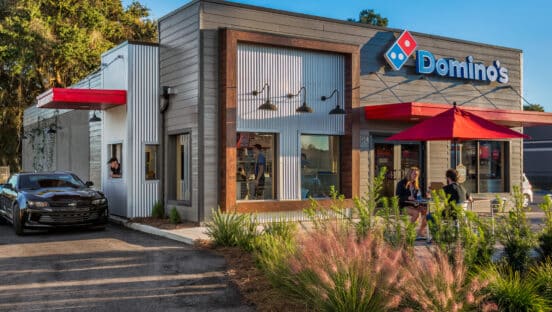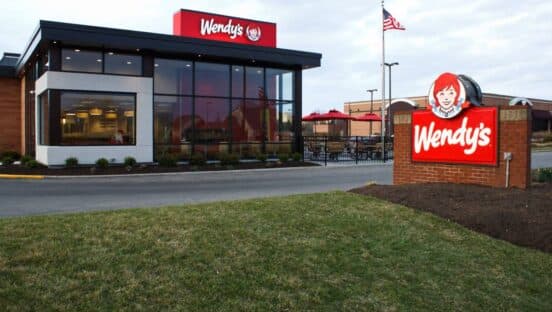Subscribe to “Fast Forward”: iTunes | Spotify | Google Play | Stitcher
Scott and Ally Svenson knew what they were getting into when they created MOD Pizza. The Seattle natives had found their knack for the food business when they started London-based Seattle Coffee Company (eventually acquired by Starbucks) and honed it while helping to build the Italian brand Carluccio’s. Their itch to create MOD Pizza back home in Seattle came just as the fast-casual industry started to gain traction. And now, with more than 400 locations across 28 states and the U.K., Scott and Ally are the leaders behind the nation’s fastest-growing fast-casual brand.
The Svensons imparted the crucial business skills they learned along the way on the latest episode of QSR’s podcast, “Fast Forward.”
Something’s brewing
When Ally moved to join Scott in London in the early ’90s, she was less than impressed with the U.K. She started a list of things that she missed from the U.S., and on the top of the list was high-quality, Seattle-style coffee.
READ MORE: MOD Pizza takes aim at 1,000 locations with $160 million investment.
The Svensons spent four years debating what to do with their dilemma, including reaching out to Starbucks about helping it open in the U.K. “We just wanted to get a great cup of coffee, and we called them. They ended up going to Japan first,” Ally says.
Starting a business in a well-established market like London was intimidating. But the Svensons took the leap after a friend proposed an ultimatum to either start a business or leave London. So the pair opened the Seattle Coffee Company in 1995. Even then, they had trouble finding the proper supplies for high-quality coffee—not to mention an audience.
A line scribbled on a sticky note helped to keep the business centered as it grew. “It simply said, ‘Our goal is to create a Seattle-style coffee bar that would fool a Seattleite,’” Ally says. Keeping a brand message has been a staple for their business practices ever since.
Pizza with purpose
The Seattle Coffee Company grew to 70 locations in the U.K., along with several international locations, by the time the Svensons sold to Starbucks. They’d looked up to Starbucks as a role model for their own business and were excited to see the inner workings of an established machine. But after working alongside the Starbucks team for a short period, the Svensons opted to leave the coffee business behind.
“After being inside a Starbucks for a while managing a bigger business, we realized we wanted to get back to building,” Scott says.
The Svensons then spent 11 years building a U.K.-based Italian concept called Carluccio’s alongside its founders. Along the way they learned Italian food trends, and realized it was one of the largest restaurant categories in the U.S. but had virtually no innovation in a generation.
“Meanwhile, you’ve had the rise of the fast-casual service model that has really brought different food categories to consumers in a new, accessible, more relevant way for today’s lifestyles,” Scott says. “We started this exploration of what it would look like to bring the fast-casual model to pizza.”
Like their first business, the Svensons developed MOD when they realized there was a hole in the market that could be filled.
“Sometimes, like coffee in the U.K., it’s the simple insights that matter,” Scott says.
Outside the box
Ally and Scott pride themselves on MOD’s dedication to great service and quality. When the first restaurant opened in downtown Seattle during the recession, in 2008, great service and quality were desperately needed.
“It needed to be a welcoming, friendly, affordable place. And we needed to be giving people secured, reliable jobs at a time when people are job insecure and financially insecure,” Ally says.
Part of that mission includes hiring individuals who typically have barriers to employment, particularly second-chance hires. The Svensons also strive to guarantee that customers will enjoy their pizza by whatever means necessary. In fact, in its first five years, MOD only grew to 12 locations because the team was busy tweaking the concept to prepare it for expansion.
The Svensons say their drive to grow MOD is rooted in a desire to have a social impact. The brand’s unusual aim to use pizza as a means rather than an end signals the company’s commitment to its mission.
“The importance of authenticity cannot be understated,” Ally says. “Because if things are being created and done from an authentic place, there’s just more of a conviction—it’s something that’s meant to be.”
Want to learn more? Subscribe to “Fast Forward,” QSR’s podcast interviewing fast-casual founders, innovators, and entrepreneurs. Visit QSRmagazine.com/podcast for the entire archive.






